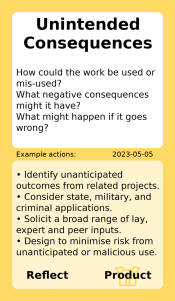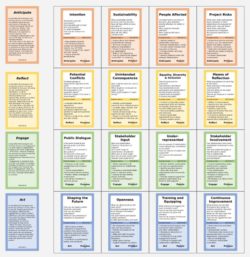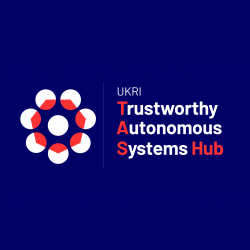RRI Prompts and Practice Cards
In collaboration with the Trustworthy Autonomous Systems Hub, Horizon has developed a set of “high level” Responsible Innovation (RI) Prompts and Practice Cards. The cards highlight 16 different aspects of Responsible Research and Innovation (RRI) that may be relevant to researchers and innovators. physical copies of the cards can be used in face-to-face activities or digital copies in online activities (e.g. in a miro collaborative whiteboard).

An example RRI Prompts and Practice Card
Each card has:
- a short title, which summarises the concept or concern,
- a set of prompts, i.e. questions to reflect on,
- a set of practices, i.e. things that a research project might do to help to address this issue.
The cards are based on the AREA-Plus Framework for RRI: each one emphasises one element of the AREA framework (Anticipate, Reflect, Engage, Act) and one of the “4 Ps” (Purpose, Product, People, Process). These are shown at the bottom of the card, in its colour and on the back.
The cards can be used to:
- to explore RRI,
- to reflect on a project and plan RRI activities,
- to facilitate a discussion about priorities for RRI in a research or application area,
- or something completely different…
How to get the cards
The cards are currently (November 2023) version 3.1.1. This is a small update of the second major public release of the cards (version 2.1, August 2022, was the first major release).

Images and PDFs of the cards
Acknowledgement: These cards have been developed by the Horizon Digital Economy Research Institute at the University of Nottingham in collaboration with the Trustworthy Autonomous Systems Hub, supported by UKRI [grants EP/T022493/1 and EP/V00784X/1]
Please cite: Virginia Portillo, Chris Greenhalgh, Peter J. Craigon, and Carolyn Ten Holter. 2023. Responsible Research and Innovation (RRI) Prompts and Practice Cards: a Tool to Support Responsible Practice. In Proceedings of the First International Symposium on Trustworthy Autonomous Systems (TAS ’23). Association for Computing Machinery, New York, NY, USA, Article 57, 1–4.
Or for the cards themselves: Chris Greenhalgh, Peter Craigon, Virginia Portillo, Liz Dowthwaite, Elvira Perez Vallejos, Helena Webb, Hanne Gesine Wagner, Bernd Carsten Stahl, Carolyn Ten Holter. 2023. Responsible Innovation (RI) Prompts and Practice Cards (version 3.1.1, November 2023).
Some suggested activities
Version 3.1 (and above) of the cards includes cards with suggested activities, as well as cards that introduce Responsible Innovation and the AREA Framework and a list of potential stakeholders.
RRI Introduction
Approximate time 15 minutes depending on how many rounds of discussions take place.
- Set aside the black “Can you agree” cards.
- Lay out the RRI cards in a grid reflecting the AREA-Plus framework, i.e. Product, Process, People, Purpose in one direction and Anticipate, Reflect, Engage, Act in the other (as above).
- Spend a minute or two looking at the card titles and the grid to get a sense of what the columns and rows mean.
- Pick a column or row (e.g. Product or Anticipate) and discuss which card in that column or row is most important for your work and why. Note, you can assign a card to each participant; this may be particularly useful online.
- Repeat for other columns or rows (potentially all of them if you have enough time).
Optional follow-up: If there was a card that didn’t seem relevant then challenge yourselves: whose problem is that?
Project self-assessment
Use this option for a more comprehensive exercise which focuses on a specific project. It is best done with other members of the project team, and a “critical friend”. Approximate time to complete 1 hour.
- Lay out the five black “Can you agree” cards face-up.
- Briefly familiarise yourself with the cards, for example laying them out in a grid reflecting the AREA-Plus framework (see above).
- Work through the other cards as a project team, placing each card next to the most appropriate “can you agree” card.
- Use the example actions on the cards next to “Quick wins” and “Most important… and we need to agree some actions” to decide what to do next.
Sharing RRI Best Practice
This exercise allows a diverse group of researchers to reflect on how RRI has been “done” across a number of different projects. It can work well online as well as in person.
- Lay out the RRI cards in a grid reflecting the AREA-Plus framework (see above).
- (Everyone) Think of a good (or bad) example of doing RRI from a previous project (it could be one simple thing you did).
- Write a very short summary on a note and place it next to the most relevant card.
- Take it in turns to explain your notes.
- Find a way to share the best ideas with other researchers.
For more information see:
Virginia Portillo, Chris Greenhalgh, Peter J. Craigon, and Carolyn Ten Holter. 2023. Responsible Research and Innovation (RRI) Prompts and Practice Cards: a Tool to Support Responsible Practice. In Proceedings of the First International Symposium on Trustworthy Autonomous Systems (TAS ’23). Association for Computing Machinery, New York, NY, USA, Article 57, 1–4.
Marina Jirotka, Barbara Grimpe, Bernd Stahl, Grace Eden, and Mark Hartswood. 2017. Responsible research and innovation in the digital age. Commun. ACM 60, 5 (May 2017), 62–68.
Chris Greenhalgh, Peter Craigon, Virginia Portillo, Liz Dowthwaite, Elvira Perez Vallejos, Helena Webb, Hanne Gesine Wagner, Bernd Carsten Stahl, Carolyn Ten Holter. 2023. Responsible Innovation (RI) Prompts and Practice Cards (version 3.1.1, November 2023). (or version 3.1, or version 2.1, August 2022.





















